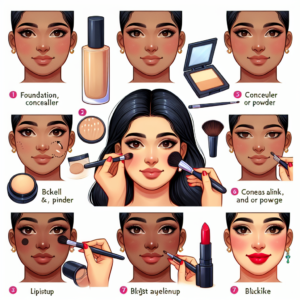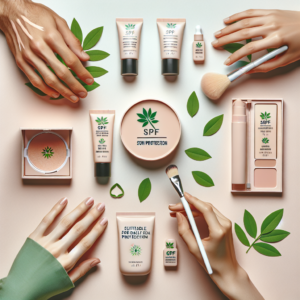Key Takeaways
- Vegan hypoallergenic SPF makeup is ideal for sensitive skin, avoiding common irritants and animal-derived ingredients.
- SPF in makeup protects sensitive skin from UV rays, which can exacerbate skin issues.
- Look for mineral-based SPF products, as they are less likely to cause reactions compared to chemical sunscreens.
- Avoid ingredients like parabens, phthalates, and synthetic fragrances that can irritate sensitive skin.
- For best results, apply makeup with gentle techniques and clean tools to minimize skin stress.
Why This Makeup is a Game Changer for Sensitive Skin
Imagine a makeup that not only beautifies but also protects and cares for your sensitive skin. That’s the beauty of vegan hypoallergenic SPF makeup. This type of makeup is a breath of fresh air for those who have struggled with skin reactions from conventional products. Its plant-based formula, free from animal by-products and harsh chemicals, is designed to be kind to your skin. Most importantly, it includes SPF to defend against the sun’s rays, which can be particularly harmful to sensitive skin types.
Anatomy of a Skin-Safe, Sun-Protective Formula
A well-formulated vegan hypoallergenic SPF makeup product is a symphony of skin-loving ingredients. It’s crafted with minerals like zinc oxide or titanium dioxide to reflect UV rays, and without the common allergens that can cause skin flare-ups. Because of this, you can wear makeup without the fear of irritation or damage from the sun. Besides that, these products are often enriched with natural oils and antioxidants, providing nourishment and a soothing effect to your skin.
The Fact on Vegan Hypoallergenic Makeup
Defining ‘Vegan’ and ‘Hypoallergenic’ in Cosmetics
Vegan makeup means that no animal-derived ingredients are used, which is not only ethical but also beneficial for sensitive skin, as animal products can be potential allergens. ‘Hypoallergenic’ implies that the product is less likely to cause allergic reactions, though it’s not a guarantee. This term is not strictly regulated, so it’s important to read labels and know what specific ingredients your skin can tolerate.
When these two qualities combine in makeup, you get products that are more considerate of both animal welfare and human health. This is why vegan hypoallergenic makeup is becoming a go-to for many with delicate skin. It’s a conscious choice that’s all about minimizing risk and maximizing care.
The Intersection of Ethics and Allergy-Safe Ingredients
Choosing vegan hypoallergenic SPF makeup isn’t just a personal preference; it’s a stand for ethical beauty. By selecting these products, you’re saying no to animal testing and yes to ingredients that are less likely to cause skin distress. This intersection of ethics and health is at the heart of the vegan beauty movement, and it’s a powerful way to ensure your beauty routine aligns with your values and your skin’s needs.
Choosing the Right SPF: Mineral vs. Chemical Sunscreens
When it comes to sun protection, especially for sensitive skin, mineral sunscreens are the way to go. Unlike chemical sunscreens that absorb into the skin and can cause irritation, mineral sunscreens sit on top of the skin and reflect UV rays. This means they’re less likely to cause a reaction and are better suited for those with skin sensitivities. So, when picking your vegan hypoallergenic SPF makeup, opt for products with zinc oxide or titanium dioxide as their active ingredients.
Ingredients to Love and Ones to Leave
Champion Ingredients for Sensitive Skin Health
Your skin deserves the best, and that means feeding it with ingredients that nourish and protect. Look for vegan hypoallergenic SPF makeup that contains:
- Aloe Vera: Known for its soothing properties, it helps calm irritated skin.
- Shea Butter: A rich emollient that moisturizes without clogging pores.
- Green Tea Extract: An antioxidant that protects against environmental stressors.
These ingredients are not only gentle on the skin but also help to improve its overall health. By using makeup that includes these natural wonders, you’re giving your skin an extra dose of care while you wear it.
Common Irritants and How to Spot Them
Just as there are ingredients that love your skin, there are those that it could do without. To keep your sensitive skin happy, steer clear of:
- Parabens: Preservatives that can disrupt hormone function and irritate skin.
- Phthalates: Chemicals often found in fragrances that can cause allergic reactions.
- Synthetic Fragrances: These can be a cocktail of irritants that lead to redness and breakouts.
Being aware of these common irritants and checking the ingredient list is key to avoiding unwanted skin reactions.
Top Picks for Vegan Hypoallergenic SPF Makeup
Choosing the right makeup for your sensitive skin can be daunting, but I’ve got you covered. After extensive research and consideration, here are some top picks that combine vegan, hypoallergenic, and SPF qualities:
For a flawless base that protects and perfects, ILIA Beauty Super Serum Skin Tint SPF 40 is a fan favorite. It’s a serum, moisturizer, and foundation in one, packed with plant-based squalane, niacinamide, and hyaluronic acid.
Another excellent option is the Mineral Fusion Pressed Powder Foundation SPF 15, which offers buildable coverage and the skin-soothing benefits of sea kelp and vitamin C, all while being gentle on the skin.
These products not only help even out your complexion but also add an extra layer of protection against the sun, making them a smart addition to your sensitive skin care routine.
Foundation with Fortitude: Best Bases for Sensitive Skin
When it comes to foundation, those with sensitive skin need to be particularly selective. A good foundation should do more than just cover imperfections; it should also protect and nourish. The Tarte Amazonian Clay BB Tinted Moisturizer SPF 20 is a great example, as it provides lightweight coverage and skin-loving ingredients like chamomile extract and vitamins A, C, and E.
Remember, the goal is to enhance your skin’s health while you wear makeup, not just to cover up issues. So, choose foundations that are as kind to your skin as they are effective in providing coverage.
Conscious Color: Eye Shadows and Lip Products that Pamper
It’s not just about the base; your color cosmetics should be sensitive skin-friendly, too. For eye shadows, look for brands like Ecco Bella, which offer a range of vibrant shades in formulas that are gentle on the delicate eye area. For lips, ILIA Tinted Lip Conditioner SPF 15 brings together beautiful color, moisturizing care, and sun protection in one swipe.
With these products, you can add pops of color to your look without worrying about irritation. They’re proof that sensitive skin doesn’t mean you have to compromise on fun and fashion in your makeup choices.
How to Apply Makeup for Long-Lasting, Sensitive Skin-Friendly Wear
Applying makeup on sensitive skin is all about the technique. Here’s how to do it gently:
- Start with a clean and moisturized face to ensure a smooth application.
- Use clean tools to avoid transferring bacteria onto your skin.
- Apply makeup in light layers, building up coverage as needed to avoid caking.
By following these steps, you can achieve a beautiful makeup look that lasts all day without stressing your skin.
Remember, when it comes to sensitive skin, less is often more. Gentle application, clean tools, and the right products can make all the difference in maintaining your skin’s health and confidence in your look.
How to Apply Makeup for Long-Lasting, Sensitive Skin-Friendly Wear
Now that we’ve covered the best products, let’s dive into the application. Applying makeup for sensitive skin is an art in itself. It requires a gentle touch and the right technique to ensure your makeup lasts without irritating your skin.
Step-by-Step to a Gentle, Long-Lasting Look
First, always begin with a clean canvas. Gently cleanse your face to remove any impurities or leftover makeup. Next, moisturize with a hypoallergenic, fragrance-free moisturizer to hydrate your skin. Give it time to absorb—this ensures your makeup glides on smoothly.
When applying foundation, use a soft brush or a sponge to dab the product onto your skin lightly. Avoid rubbing or pulling; this can cause redness or irritation. Instead, blend with gentle patting motions, starting from the center of your face and working outward.
For eye makeup, use hypoallergenic pencils or shadows, and apply them with care. If you’re using powder shadows, tap off the excess to avoid fallout that could irritate your eyes. As for lips, apply a nourishing balm first, then add color with a hypoallergenic lipstick or gloss.
Pro Tips to Avoid Irritation During Application
Remember, the goal is to minimize the risk of irritation. Here are some pro tips to keep in mind:
- Always apply makeup in a well-lit area to avoid over-application.
- Choose brushes with soft bristles and clean them regularly to prevent bacteria buildup.
- Test new products on a small area of your skin before full application.
- Keep your makeup routine simple—fewer products mean less chance for irritation.
By following these guidelines, you can create a beautiful look that respects your skin’s sensitivity and lasts all day.
FAQs: Navigating Vegan Hypoallergenic SPF Makeup like a Pro
Is vegan makeup always hypoallergenic?
Not necessarily. While vegan makeup avoids animal-derived ingredients, it can still contain plant-based allergens. Always check the ingredient list for known irritants, and perform a patch test if you’re trying a new product.
Can SPF in makeup cause skin sensitivity?
It can, especially if you’re sensitive to chemical sunscreens. Opt for mineral-based SPF in makeup, which is less likely to cause reactions. Ingredients like zinc oxide and titanium dioxide are your friends here.
How often should I reapply SPF makeup throughout the day?
For continuous protection, reapply every two hours, especially if you’re spending time outdoors. If you’re indoors most of the day, reapplying once midday should suffice. Remember, sun damage can occur even through windows or on cloudy days.
What should I do if I have a reaction to hypoallergenic makeup?
First, remove the makeup immediately with a gentle cleanser. Apply a soothing moisturizer or hydrocortisone cream if needed, and give your skin a break from makeup until the reaction subsides. If the reaction is severe or persistent, consult a dermatologist.
Are vegan and organic makeup the same thing?
No, they’re not. Vegan makeup means there are no animal-derived ingredients, while organic makeup means the ingredients are farmed without synthetic fertilizers or pesticides. A product can be one, both, or neither, so it’s important to read labels carefully.




